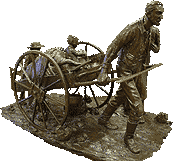The Mormon Handcart Experiment

On June 11th LDS President Gordon B. Hinckley will speak at The Handcart Pioneer Commemoration Fireside in Iowa City, Iowa. The event is to commemorate the 150th anniversary of the Mormon handcart pioneers.
In 1856 Brigham Young instituted a plan, an inexpensive way for Mormon emigrants from Europe to travel across the plains to Utah: pushing or pulling their belongings in handcarts while walking the entire 1,300 miles. Five companies of Mormon pioneers crossed America pulling handcarts. The last two companies, the Willie and Martin companies, met with tremendous tragedy. Somewhere in the neighborhood of 222 people perished due to equipment failure and early snow storms. Brigham Young's handcart plan was quickly abandoned.
Because of the sesquicentennial, the handcart tragedy has been in the news lately. One of the more interesting articles was a Deseret News report on the recent 41st annual Mormon History Association conference held in Casper, Wyoming.
Contrary to common historical accounts among Latter-day Saints, a failure of leadership among top LDS Church officials was the catalyst for the tragedy that befell the Willie and Martin handcart companies in October 1856.
That's according to a panel of researchers, who discussed culpability for the tragedy before a crowd of about 600… Scores of pioneer emigrants from Britain died of starvation and hypothermia on the high plains of Wyoming after their companies took a major risk in leaving Iowa City, Iowa, several weeks later than church leaders knew they should, panelists said.
Lyndia Carter, a trails historian from Springville who is writing a book on the tragedy, said [LDS Apostle] Franklin D. Richards--who was then serving as the church's mission president in Britain--"was responsible, in my mind, for the late departure" because "he started the snowball down the slope" that eventually "added up to disaster."…
"Faith blinded him to reason and zealousness replaced common sense."
Indeed, in The Gathering of Zion by Wallace Stegner the story is told of Franklin D. Richards' 1856 return from his mission in Great Britain. Sometime in August Mr. Richards' group of returning missionaries overtook the Willie handcart company at North Bluff Fork. They camped with the pioneers for the night. The next morning Mr. Richards called a general meeting where he rebuked Levi Savage for his lack of faith; Mr. Savage had been the only Mormon pioneer to caution the Willie and Martin handcart companies against pushing trough to Utah so late in the season. As recorded by one of the handcart captains, John Chislett:
Richards gave us plenty of counsel to be faithful, prayerful, obedient to our leaders, etc., and wound up by prophesying in the name of Israel's God that 'though it might storm on our right hand and on our left, the Lord would keep open the way before us and we should get to Zion in safety.' (The Gathering of Zion, page 243)
So certain was he of his prophecy, before continuing the journey in their swift carriages Mr. Richards' group requested fresh meat from the pioneers. Captain Willie killed and gave the Apostle the fattest calf in the handcart company camp. Mr. Chislett later wrote, "I am ashamed for humanities sake to say [the group of returning missionaries] took it" for many pioneers would starve to death as they traveled the remaining 700 miles of trail toward Salt Lake City.
Apostle Richards' prophecy failed miserably; hundreds of pioneers in those handcart companies did not get to Zion in safety. The Deseret News article reported:
[Howard Christy, professor emeritus at Brigham Young University, said,] "In my opinion, responsible leadership at the outset could have completely averted the disaster." Several recorded comments by church agents that they supposed God would intervene to protect the emigrants "shows their knowledge of the dangers of starting late. They were throwing all sense to the wind that all would be well."
As is often the case with Mormon history, the story of the Willie and Martin handcart companies has changed from one of failed prophecy and negligent leadership into a faith-promoting legacy.
Termed by some "the worst overland disaster in the history of the American West," early Latter-day Saints tended to talk about it "in hushed tones, if at all," according to William G. Hartley, associate professor of history at Brigham Young University, who moderated the [Mormon History Association] panel discussion.
"Over time, the emphasis of the story became the faith and endurance" of the emigrants, rather than the decisions that led to the disaster, he said, adding that for modern LDS youths who re-enact the handcart trek, the experience "has almost become a rite of passage."
The deaths and hardship of the handcart pioneers were tragic; and the tragedy continues today. History's attestation to failed prophecies and negligent leadership should cause people to seriously question the validity of the LDS Church and its "one true church" claims. Instead, the carefully constructed spin on the Willie and Martin story is used to appeal to peoples' emotions and anchor them more firmly than ever to an organization proven to be led by false prophets.
0 Comments:
Post a Comment
<< Home